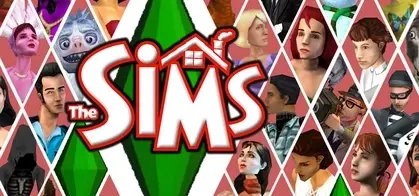this post was submitted on 28 May 2024
64 points (100.0% liked)
Gaming
30562 readers
163 users here now
From video gaming to card games and stuff in between, if it's gaming you can probably discuss it here!
Please Note: Gaming memes are permitted to be posted on Meme Mondays, but will otherwise be removed in an effort to allow other discussions to take place.
See also Gaming's sister community Tabletop Gaming.
This community's icon was made by Aaron Schneider, under the CC-BY-NC-SA 4.0 license.
founded 2 years ago
MODERATORS
you are viewing a single comment's thread
view the rest of the comments
view the rest of the comments

Each Sims game is quite different. The biggest difference is between Sims 1 and 2 simply due to the change from isometric 2D to 3D graphics. Not the first game in the genre to have 3D graphics and they weren't even particularly impressive for the time nor good compared to its competitor, but the charming animations and attention to detail make it a far more enjoyable experience than the comparatively sterile predecessor. Sims 2 ended up becoming an evergreen with very long legs, to the point that people are still playing it, although it helped that EA distributed the complete version with all add-ons (the game is older than the term DLC) for free for a while (you can still find it if you know where to look).
Sims 3 was fundamentally different from Sims 2. Gone were the isolated homes of the predecessor (initially in Sims 2, you couldn't even see your neighbors' homes unless you were on the map screen; later they added in low-res stand-ins) and instead, it's an open world game where you can see your Sim commute to work in real-time. Neighbors can be visited without going through a loading screen - it all feels more organic as a result. Customization saw a huge upgrade as well, the AI was improved, etc. Sounds nice in theory, but the problem was that it was too ambitious for PCs of the time. This series has traditionally attracted non-gamers who don't deeply upgrade their machines all that often and instead play on laptops bought for homework or old rigs inherited from big brothers. Sims 1 ran on a toaster, Sims 2 on a pizza oven with some kind of GPU grafted to it - whereas Sims 3 was one of the most demanding games of its time in order to facilitate gameplay changes that few people actually asked for and rounded, bloated looking Sims that are somewhat offputting. It was still a massive success and a huge hit with modders as well, but Sims 2 remained popular due to its more focused nature, the fact that it ran on anything and the fact that it was complete with a massive library of add-ons that took years to be replicated in Sims 3.
Sims 4 reset the series back to Sims 2, but went too far initially, limiting player freedom in regards to neighborhood creation. Instanced homes returned, customization features and open world of Sims 3 were cut, the AI saw a massive improvements, Sims didn't all look obese anymore, hardware requirements were modest again - but at the price of having incredibly intrusive DRM, an attempt to monetize the proud modding community and being very bare-bones in the beginning, requiring years of DLCs to reach feature-parity with Sims 2 and 3. IIRC, even pools - an absolutely essential part of Sims lore - were missing initially. All of the improvements to the building mechanics in particular were overshadowed by EA's corporate nonsense. It's come a long way since though. Just like with the predecessors, buying all DLC at once will make you poor - but the base game is free now and the actual intention is that you only buy the DLC that have features or items you care about. The modding scene is as vibrant as ever, making any non-feature DLC unnecessary anyway.
This series is an interesting and unique phenomenon. It's a prime example of something that only ever truly works on PC. All of the many console, mobile and browser spinoffs and ports were nothing but mere blips on the radar, because fundamentally, it can only work on a platform as open as the PC. It primarily attracts female players who rarely play anything else, yet dive deep into modding and modifying every little aspect of these games like the most hardened PC nerds. It started out and still is in many ways a faksimile of ideal American suburbia, although enhanced by both some quite subversive humor and subverted by an astonishing level of player freedom that goes against the conformity of the real world - while at the same time replicating the fads, consumerism, cliques, feuds and other less wholesome aspects of the real world through its behemoth of a community. It's ultimately a platform for individual creative expression and the worlds (both in-game and outside of it) that emerge as a result of it, a sandbox that was only ever bested by Minecraft, which literally broke everything down to its individual building blocks. Each game and its DLCs become more like car payments to seasoned players, something you pay for so that you can travel where you want to go, which in turn keeps the experience fresh, finances further development and prevents the community from getting stagnant as it has to learn to adapt to changes from the developers.
I'll end this here. This wasn't meant to turn into an essay and now my fingers hurt, because I typed all of this nonsense on a touchscreen.
I thoroughly enjoyed that! I'd read your blog!